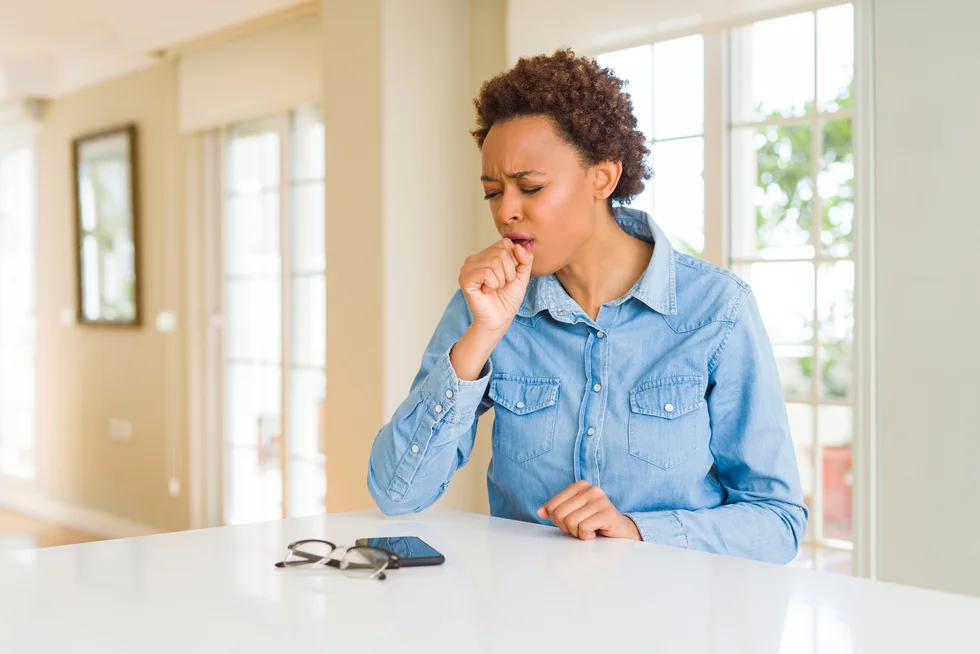By Sherrie Palm for Women's Health Foundation
It's that time of year again—flu season. You're coughing and hacking until you feel like your bottom is going to blow out. Believe it or not, it just might be.
If you're anything like me you start to ramp up the germ-phobe aspect of your personality around this time of year. Many of us start paying more attention to washing our hands, get nervous about grabbing the shopping carts or doors at stores and walk the other way when we hear someone coughing. No one wants to get the flu.
Learn more about getting ready for flu season.
Yet, despite the extra protective measures we take, we somehow manage to contract it. The majority of us are exposed to hundreds of germ-infested surfaces every day. There's just no way around it beyond wrapping ourselves in one of those protective bubbles—not a very user-friendly way to avoid getting sick.
On a trip overseas I had concerns about being in airplanes and airports, knowing that the odds of my catching a bug were increased by being exposed to so many people in an enclosed environment. Every time someone sniffled or hacked on the plane, I kept repeating my winter mantra to myself: "Keep your hands off your face. Keep your hands off your face." I recited it like some kind of protective cloak that would shield me. Although I felt badly for the young child coughing nonstop a few rows up from me, I equally worried that somehow the germs would float back to me in the recycled air of the plane.
Somehow, I managed to make the long journey in both directions and come home with my body flu-free. I figured now I could relax—lucky germ-free me.
Then the inevitable happened: a friend came over, sat at my kitchen table with his stuffy head and postnasal drip. Sure enough, I picked up his bug. Standard operating procedure—take all necessary precautions when traveling and then come home and relax into germ-land. Serves me right for letting my guard down and returning to my hands-on-my-face bad habit.
As I was coughing (and coughing and coughing), I kept reflecting about how coughing affects women with pelvic organ prolapse (POP). Although chronic coughing is a known cause of POP, that impact is from a cough related to a respiratory condition or women who have a smoker's cough that lingers for years. I'd like to make some suggestions for women who have a cough related to the cold and flu season.
For women with POP, every time you cough your internal organs push down into your vaginal canal. If you don't believe me, cup your hand in your crotch area the next time you feel a cough coming on. You will feel the downward pushing of the internal organs and tissues.
Many women with POP choose treatment options rather than surgery, and there are also many women with POP in milder grades that are in a monitoring stage and haven't had treatment or surgery. For these women, it is important that, when possible, you follow through with placing that hand-in-the-crotch area when you feel coughing coming on.
You should also contract your pelvic floor muscles (also known as pubococcygeus or pc muscles) before coughing or sneezing if possible. That will help prevent urine from leaking.
I've gotten into the habit of turning away from people when coughing (a polite gesture no matter what), bending at the waist a bit when coughing and cupping my hand firmly between my legs to support my pelvic floor as much as possible when I am someplace I can do it discreetly.
I've had surgery for my POP, but I feel a lifetime of maintenance with any health issue just makes sense. People will be so happy you turn away from them when you cough that they won't even notice your hand is on your crotch. Trust me—I've tried this in public. Help others, help yourself.
Sherrie Palm is the founder, CEO and executive director of the Association for Pelvic Organ Prolapse Support, a nonprofit foundation for pelvic organ prolapse support. She is also author of Pelvic Organ Prolapse: The Silent Epidemic, and a key opinion leader on pelvic organ prolapse. As a women's pelvic floor health advocate, she devotes her time to establishing recognition of pelvic organ prolapse and providing support pathways for women in various stages of POP. For relaxation Sherrie enjoys spending time in the woods and meadows of northern Wisconsin, walking with her dogs and taking digital photos of nature. For more info about APOPS or Sherrie Palm, visit Pelvic Organ Support.







